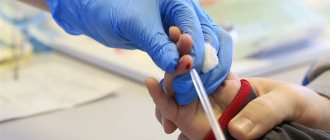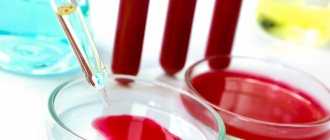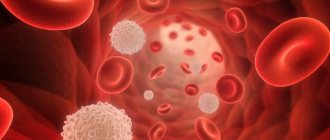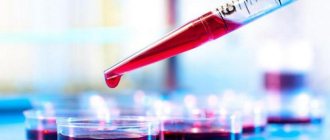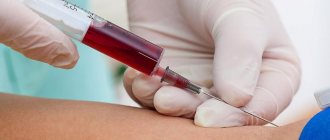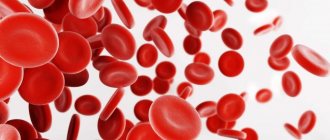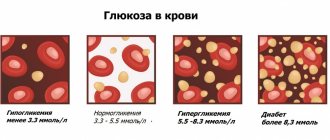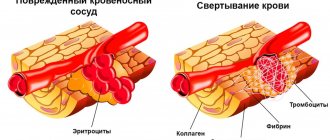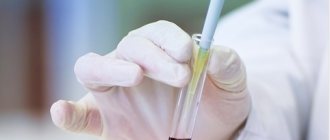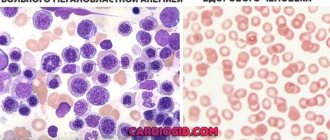A blood test for RW, or Wasserman reaction, is one of the methods for diagnosing such a serious sexually transmitted disease as syphilis. It was developed by German immunologist August Wasserman. Since the study is quite simple and effective, it is used as a rapid test for syphilis.
To detect the causative agent of syphilis - Treponema pallidum - in the blood, an RW test is prescribed
Analysis for RW makes it possible to identify not the causative agent of the disease (treponema pallidum), but antibodies, which are a sign of its presence. What is the Wasserman reaction? After antigens (foreign proteins that enter the structure of the pathogen’s cells) enter the body, an immune response occurs.
The structure of Treponema pallidum consists of a large number of compounds that have antigenic properties. The composition of antibodies depends on the stage of the disease, the immune response and the characteristics of the body.
One of the antigenic compounds of Treponema pallidum is cardiolipin (a nonspecific antigen that is also present in bovine heart). It is to this that antibodies are determined when performing an RW analysis.
To diagnose syphilis, cardiolipin and complement (a special binding protein) are added to the blood sample. In the presence of antibodies to cardiolipin, a complement fixation reaction occurs, in which all components combine and precipitate. The analysis is done over a short period.
Evaluation of the Wasserman reaction result
A blood test for syphilis becomes positive 6–8 weeks after infection. Depending on how much sediment there is, the results are evaluated as follows:
- “++++” – strongly positive reaction;
- “+++” – positive reaction;
- “++” or “+” – weakly positive reaction;
- “-” – negative reaction.
If there is even one “plus”, it is necessary to take additional tests for syphilis. If there is no reaction, this means that the person is healthy. A venereologist or infectious disease specialist should interpret the results.
What is RW blood test
A special category of medical tests includes blood tests for RW, or the Wassermann reaction. This technique detects markers of syphilis in the blood and determines how much time has passed since infection (after contact with a carrier of the infection). Today, donating blood for RW is the only way to diagnose the latent form of the disease. The reliability of the analysis influences the treatment program, the result of which determines the patient’s quality of life.
Syphilis is a chronic venereal disease caused by the pathogen Treponema pallidum. Characterized by the manifestation of ulcers on the skin and mucous membranes. With timely diagnosis, syphilis can be successfully treated with immunomodulatory drugs. The RW analysis determines the causative agent of syphilis and specific antibodies to it produced by the human immune system.
Detailed description of the study
Syphilis is an infectious disease caused by Treponema pallidum. Transmission of infection occurs primarily through sexual contact without the use of barrier contraception. However, it is possible to become infected with treponema pallidum through contact and household contact if personal hygiene rules are not observed, as well as transmission of the pathogen from mother to child during childbirth or breastfeeding. Syphilis can affect any organs and systems. In the absence of timely treatment, the disease becomes chronic. Initially, a hard chancre is formed at the site of contact with the source of infection - a painless ulcer with a small amount of transparent content on the surface. Often the body reacts to the introduction of the pathogen by inflammation of the lymph nodes located near the site of the lesion. Within a few weeks, a scar forms in place of the chancre. However, the disease does not recede, and after some time the infected person notices the appearance of a specific rash on the body - the appearance of small bright pink spots (rosacea rash). This stage is called secondary syphilis. The disease is prone to periodic exacerbations with changes in the nature of the rash. Tertiary syphilis is the result of untimely diagnosis and treatment of this disease. Along with the formation of nodes and tubercles on the skin, which are called gummas, prone to ulceration and scarring, damage to internal organs is observed. Diagnosis and treatment of syphilis is carried out by a dermatologist. To confirm the diagnosis, a modern test for determining rapid plasma reagins, or RPR test (Rapid Plasma Reagins), is used. These proteins are antibodies to the lipid components of cells destroyed by the pathogen.
Indications for analysis
Medical workers, employees of cosmetology and dermatology offices, and food workers are required to donate blood for RV. Other indications for a specific test are:
- pregnancy planning;
- preparation for operations;
- unprotected sex (especially with a new partner);
- suspicion of sexually transmitted infections;
- blood or sperm donation;
- the appearance of an incomprehensible rash on the mucous membranes and skin, discharge from the genitals, disruption of the menstrual cycle in women;
- visible enlargement of lymph nodes (especially in the groin area).
Sources
- Nawaz Z., Rasool MH., Siddique AB., Zahoor MA., Muzammil S., Shabbir MU., Javaid A., Chaudhry M. Prevalence and risk factors of Syphilis among blood donors of Punjab, Pakistan. // Trop Biomed - 2021 - Vol38 - N1 - p.106-110; PMID:33797532
- Tabatabavakili S., Aleyadeh W., Cerrocchi O., Janssen HLA., Hansen BE., Bogoch II., Feld JJ. Incidence of Hepatitis C Virus Infections Among Users of Human Immunodeficiency Virus Pre-exposure Prophylaxis. // Clin Gastroenterol Hepatol - 2021 - Vol - NNULL - p.; PMID:33737225
- Chan P., Colby DJ., Kroon E., Sacdalan C., Pinyakorn S., Paul R., Robb M., Valcour V., Ananworanich J., Marra C., Spudich S. Clinical and laboratory impact of concomitant syphilis infection during acute HIV. // HIV Med - 2021 - Vol - NNULL - p.; PMID:33728759
- Larscheid G., Schulz T., Herbst H., Trögel T., Eulert S., Pruß A., Schroeter J. Comparison of Total Immunoglobulin G in Ante- and Postmortem Blood Samples from Tissue Donors. // Transfus Med Hemother - 2021 - Vol48 - N1 - p.32-38; PMID:33708050
- Wongjarupong N., Oli S., Sanou M., Djigma F., Kiba Koumare A., Yonli AT., Hassan MA., Mara K., Harmsen WS., Therneau T., Barro O., Vodounhessi G., Sawadogo S., Chamcheu JC., Simpore J., Roberts LR., Nagalo BM. Distribution and Incidence of Blood-Borne Infection among Blood Donors from Regional Transfusion Centers in Burkina Faso: A Comprehensive Study. // Am J Trop Med Hyg - 2021 - Vol - NNULL - p.; PMID:33617474
- Roy A., Das S., Fernandes M., Mohamed A., Chaurasia S. Seropositivity of blood samples of 31,355 cornea donors from a tertiary care network of eye banks. // Int Ophthalmol - 2021 - Vol - NNULL - p.; PMID:33590371
- Maan I., Lawrence DS., Tlhako N., Ramonshonyana K., Mussa A., Wynn A., Marks M., Ramogola-Masire D., Morroni C. Using a dual antibody point-of-care test with visual and digital reads to diagnose syphilis among people living with HIV in Botswana. // Int J STD AIDS - 2021 - Vol32 - N5 - p.453-461; PMID:33570464
- Chu ZX., Shen G., Hu Q., Wang H., Zhang J., Dong W., Jiang Y., Geng W., Shang H., Xu J. The use of inappropriate anal douching tool associates with increased HIV infection among men who have sex with men: a cross-sectional study in Shenyang, China. // BMC Public Health - 2021 - Vol21 - N1 - p.235; PMID:33509136
- Attie A., de Almeida-Neto C., S Witkin S., Derriga J., Nishiya AS., Ferreira JE., Costa NSX., Alves Salles N., Facincani T., Levi JE., Sabino EC., Rocha V., Mendrone-Jr A., Ferreira SC. Detection and analysis of blood donors seropositive for syphilis. // Transfus Med - 2021 - Vol31 - N2 - p.121-128; PMID:33480044
- Davison KL., Reynolds CA., Andrews N., Brailsford SR. Blood donation by men who have sex with men: using evidence to change policy. // Vox Sang - 2021 - Vol116 - N3 - p.260-272; PMID:33400285
How to take a blood test for RW
A blood test for RV is taken on an empty stomach - at least six hours must pass between meals and the laboratory test. Tests in an adult are taken from the ulnar vein, in an infant - from the cranial or jugular vein. The patient is seated on a chair or laid on a couch, a vein is pierced and 8-10 ml of blood is taken and sent for testing. After collecting the material, proper nutrition and plenty of fluids are recommended (it is better to prefer hot sweet tea). On this day it is better to avoid physical activity and alcohol.
Complexes with this research
Expanded hospital complex Expanded infectious screening for prevention and hospitalization 7,700 RUR Composition
Entry into IVF Examination when a woman enters the IVF procedure 23,020 RUR Composition
Eight infections. Complex for men Comprehensive diagnosis of eight STIs RUR 5,310 Composition
IN OTHER COMPLEXES
- Eight infections. Complex for women 5 310 RUR
- Women's check-up No. 1 RUB 19,290
- Preparation for partner childbirth for a man RUB 3,680
- Male infertility. Extended examination RUB 29,030
- Future dad 8,460 RUR
Decoding
The results form includes pluses or minuses. The latter speak of a negative reaction and absence of illness. A positive reaction can be described with one to four plus signs. The transcript shows the stage of the disease:
- ++++ or +++ – positive test;
- ++ – weakly positive;
- + – doubtful, requires re-checking.
If the RW analysis shows a negative result, this does not exclude that a person has syphilis at the first or third stage. Plus, a negative reaction may indicate the destruction of red blood cells. The secondary period of syphilis does not always show a positive result. In the first 17 days the reaction may be negative, and only by the sixth week it may show ++++, and even then only in 25% of patients with syphilis. After this, the reliability approaches 80%. Approximately 5% of healthy people show a false positive result.
- Ginger root - how to use it at home. Useful properties and contraindications of ginger root
- Facial cleansing by a cosmetologist: procedure and reviews
- Surge filter - overview of models. Why do you need a surge protector, device and choice for household appliances
RV test is positive
If the test for RV is positive, this indicates the presence of antibodies to Treponema pallidum in the blood - that is, about 1.5 months have passed since the infection. Other reasons for the appearance of ++++ on the results sheet are:
- carrying out antisyphilitic therapeutic measures - reducing the acute process;
- pregnancy in the absence of the disease itself - the analysis will be weakly positive in approximately 1.5% of women;
- primary syphilis – 80% of cases at 6-8 weeks;
- secondary syphilis in 100% of cases;
- clinical relapse of the disease;
- tertiary period of the disease - in 75% of cases;
- early congenital syphilis.
RW negative
If you receive a negative test result, you can talk about the absence of infection and antibodies to syphilis in the body, but this is not always the case. In the early stages of the disease, the results will be negative because antibodies simply do not have time to develop. Plus, certain diseases and individual characteristics of patients influence the reliability failure.
The most frequently asked questions about syphilis tests
02.08.2018
Quantity
The most frequently asked questions about syphilis tests
How to get tested for syphilis for free?
To do this, you need to go to the clinic at your place of residence and visit your local doctor, who will give you a referral for testing. Testing for syphilis is free for all residents of the Russian Federation under the compulsory medical insurance policy.
Where can I get tested for syphilis anonymously?
Tests can be done anonymously in any paid laboratory; skin and venous dispensaries often offer this service themselves. It is also possible to test for syphilis at home using rapid tests that are sold in pharmacies. However, it must be remembered that such a test does not give an accurate result, and if you suspect syphilis, you should consult a doctor.
How many days after sexual intercourse can you donate blood for syphilis?
If infection has occurred, the test for syphilis will be positive no earlier than ten to fourteen days later. This period may be longer, so if the results are negative, the test should be repeated after 2 weeks.
Where is blood taken for syphilis?
Blood for syphilis is most often taken from a vein, but can also be taken from a finger. It depends on the type of analysis.
Preparation. How to get tested for syphilis?
Before donating blood for syphilis, you should not eat for four hours—blood must be donated on an empty stomach. In addition, you should not drink alcohol 12 hours before the test. This is important because liver damage from alcohol can cause false positive tests.
How long does it take to test for syphilis on average?
The results are usually known the next day. Conducting rapid tests takes no more than 30 minutes.
What test is taken for syphilis and what is it called?
For screening, when there is no suspicion of the disease, either RMP (microprecipitation reaction) or RPR (rapid plasma-reagin test). Sometimes such screening tests are called the Wasserman reaction. If there are any real suspicions or doubts, they are never limited to one analysis. At the same time, one of any of the screening group (RMP or RPR) and one of any of the more specific testing group (RPGA or ELISA) are performed, then they act depending on the results and the patient’s history.
Can a syphilis test be wrong?
Maybe!
The probability of error in different methods depends primarily on the period of illness and the general condition of the body. Non-treponemal tests are most sensitive at the height of the disease - in the secondary period. Due to their low specificity, they often give false-positive results. This can happen due to fever, flu or other infectious disease, recent vaccination, chronic diseases and a number of other reasons. Treponemal tests are more sensitive in the later period. They can also give false-positive results, but only if there are pathogenic bacteria similar to Treponema pallidum in the body that cause other diseases: non-venereal treponematoses pinta (rare in Russia) or Lyme disease (transmitted through a tick bite).
False negative test results are possible with all diagnostic methods. They depend on the body's immune response: no response - no reaction to syphilis. This is possible in people infected with HIV, as well as those who are immunocompromised for other reasons. In addition, there is a reverse reaction: hyperproduction of antibodies, the “prozone” effect, in which there are so many antibodies that they prevent each other from reacting with the antigen. The result is a false negative result.
For a simpler understanding of the material, here is a table of deciphering the results of a clinical and laboratory examination of a patient:
• If the non-treponemal test (one of the RMP/RW/RPR) and the treponemal test (RPGA/ELISA) are positive, an additional alternative treponemal test is performed (ELISA if the first test was RPGA, and vice versa - RPGA if there was an ELISA). If the test becomes negative, the patient's blood is sent to an expert laboratory and additional tests are performed. If the second treponemal test becomes positive, a diagnosis of “latent syphilis” is made. This condition may persist for some time after treatment. If the patient has been treated before, then in order to confirm the diagnosis, an additional test for IgM is performed. If the results are positive, the diagnosis is confirmed, but the test is still recommended to be repeated after 2 weeks. If the results are negative, syphilis is refuted. • If the non-treponemal test (RTP/RW/RPR) is negative and the treponemal test (RPGA/ELISA) is positive, then the condition can be assessed as “late syphilis” or “no syphilis” if the patient has previously been fully treated. To distinguish between these two conditions, an additional IgM test is performed (IgM ELISA, RIF-abs-IgM, Immunoblotting-IgM). If IgM is present in the blood, they diagnose “late syphilis” and treat it. If not, the patient is considered healthy. • If RPR (or RW/RMP) is positive, RPGA is positive, and ELISA is negative (or vice versa: RPGA “-” and ELISA “+”), then the test results are questionable and it is recommended to send the blood to an expert laboratory or conduct alternative tests (RIF , Immunoblotting). • If the non-treponemal test (PMP/RW/RPR) is positive and the treponemal test (RPGA/ELISA) is negative, then an additional treponemal test (ELISA/RPGA) is performed. If it gives a positive result, the blood is sent to an expert laboratory. If negative, then the diagnosis is refuted, and the result of the non-treponemal test is considered false positive.
| RPR/ RW/ RMP | RPGA | Treatment was carried out | Diagnosis | Further tactics | |
| + | + | + | — | Hidden syphilis | ELISA/RIF for IgM |
| + | + | + | + | Condition after treatment | Observation by a doctor is recommended, repeat tests after 2 weeks |
| + | — | + | — | Questionable test result | It is recommended to send the blood to an expert laboratory |
| + | + | — | — | Questionable test result | It is recommended to send the blood to an expert laboratory |
| — | + | — | — | Questionable test result | It is recommended to send the blood to an expert laboratory |
| + | — | — | — | False positive result. The patient is healthy | No treatment required |
| — | + | + | + | Condition after treatment, the patient is healthy | Removal from the register |
False positive reaction
In 5% of patients, a false positive reaction is observed - a condition when the analysis shows ++, but the patient is not sick. The reasons for a false positive manifestation are:
- tuberculosis, systemic lupus erythematosus, leukemia, leprosy, leptospirosis, cancer, typhus, scarlet fever, HIV and AIDS;
- beriberi and sleeping sickness, hepatitis;
- in pregnant women or those who have just given birth;
- during menstruation;
- after anesthesia, consumption of alcohol, drugs, fatty foods, coffee, cigarettes, medications, administration of certain serums or vaccination;
- acute infections in pregnant women.
Decoding the analysis results
With primary syphilis, the Wasserman reaction becomes positive at 6-8 weeks of the disease (in 90% of cases), and the following dynamics are noted:
- in the first 15-17 days after infection, the reaction in most patients is usually negative;
- at the 5-6th week of the disease, in approximately 1/4 of the patients the reaction becomes positive;
- at the 7-8th week of the disease, RW becomes positive in the majority.
In secondary syphilis, RW is always positive. Together with other serological reactions (RPGA, ELISA, RIF), it allows not only to detect the presence of the pathogen, but also to find out the approximate duration of infection.
With the development of a syphilitic infection in the 4th week of the disease, after the onset of primary syphiloma, the Wasserman reaction passes from negative to positive, remaining so both in the secondary fresh and in the secondary recurrent period of syphilis. In the latent secondary period and without treatment, RW can turn negative so that when a clinical relapse of syphilis occurs, it becomes positive again. Therefore, in the latent period of syphilis, a negative Wasserman reaction does not indicate its absence or cure, but only serves as a favorable prognostic symptom.
With active lesions of the tertiary period of syphilis, positive RW occurs in approximately 3/4 of cases of the disease. When the active manifestations of the tertiary period of syphilis disappear, it often turns negative. In this case, a negative Wasserman reaction in patients does not indicate that they do not have a syphilitic infection.
In early congenital syphilis, RW is positive in almost all cases and is a valuable method for verifying the disease. In late congenital syphilis, its results correspond to those obtained in the tertiary period of acquired syphilis.
The study of the Wasserman reaction in the blood of patients with syphilis undergoing treatment is of great practical importance. In some patients, despite vigorous anti-syphilitic therapy, the Wasserman reaction does not turn negative - this is the so-called seroresistant syphilis. In this case, it makes no sense to carry out endless antisyphilitic therapy, achieving the transition of positive RW to negative.
From the above it follows that a negative Wasserman reaction is not always a sign of the absence of a syphilitic infection in the body.
A positive Wasserman reaction is possible in people with a number of other diseases and conditions not related to syphilis: tuberculosis, systemic lupus erythematosus, blood diseases (leukemia), leprosy, pemphigus, leptospirosis, malignant neoplasms, typhus, scarlet fever, beriberi disease, sleeping sickness , during pregnancy, before or after childbirth, menstruation, after anesthesia, after drinking alcohol, in drug abusers, taking fatty foods, taking medications, introducing foreign serums. In such cases, other methods (RPGA, ELISA, RIF) are used to clarify the diagnosis. The nonspecific positive Wasserman reaction in malaria is very characteristic, especially during the attack period. Therefore, if RW is positive in a person without clinical manifestations of syphilis and who denies syphilitic infection, malaria should be considered.
All of the above indicates that a positive result of the Wasserman reaction is not yet unconditional evidence of the presence of a syphilitic infection.
Recovery after testing
After taking a blood test, doctors recommend a proper and balanced diet, as well as plenty of fluids. You can afford warm tea and chocolate. It will be useful to refrain from physical activity and under no circumstances drink alcohol.
What to do if RW is positive
If the obtained data show ++++ or ++, a secondary blood sampling is necessary. Sometimes ORS (disease selection response) is used. To do this, blood serum is applied to a glass slide and a cardiolipid antigen is added. If the repeated result is positive, a visit to a venereologist is required to make an accurate diagnosis.
To prevent congenital syphilis in children, pregnant women donate blood for RW during all nine months: this test is one of the mandatory procedures for expectant mothers. If a pregnant woman becomes infected, comprehensive treatment is necessary during the first months. If treatment is neglected, the consequences are dangerous for both the mother and the unborn child.
The significance of the Wasserman reaction
Timely blood testing for RW allows you to:
- clarify the final diagnosis for primary syphilis;
- determine the timing of possible infection (the reaction gives a positive result in 50% of patients in the sixth week, in 90% in the eighth);
- make a diagnosis in the latent course of the disease, this is especially important for neurosyphilis and the visceral form, when the patient is examined by doctors of different specialties, but the treatment does not work;
- evaluate the effectiveness of the therapy, remove recovered persons from the dispensary register;
- examine all persons from the environment of the sick person (the source of infection) for the purpose of timely preventive treatment;
- forensic medical experts to find out complete information in a criminal case.
Price
You can donate blood for RW in private clinics or district hospitals. When undergoing a medical examination under the compulsory medical insurance policy, the patient has the right to a free analysis during the initial examination. In private clinics in Moscow prices will be:
| Service name | Price range, rubles |
| Fasting blood collection or repeated donation | 199-300 |
| Flocculation test | 370-500 |
| Test for the presence of antibodies to spirochete pallidum | 400-500 |
| PCR test | 500-800 |
A little history
RW is short for the Wassermann reaction, which is over 100 years old. The famous German immunologist August Paul von Wasserman proposed using a special test to diagnose syphilis in 1906. True, at that time he was not yet a “fon”; he was awarded the nobility later, seven years later, for his services in research in the field of infectious infections (diphtheria, typhoid, cholera). In 1928, at the congress of Russian epidemiologists and microbiologists, a blood test for RW was officially adopted in Russia as a mandatory study. Since then, indications for implementation have been introduced in the form of standards and are relevant to doctors of any specialty.
